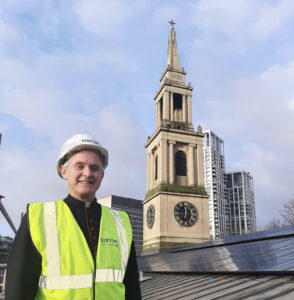Q and A: The Church of England and Net Zero

To meet our moral commitment to decarbonise, it is incumbent on government, individuals and society to do what we can to reach net zero emissions of greenhouse gases within the timeframe that the science demands. The crises currently facing us – the war in Ukraine, the cost of living and worrying signs of the destabilisation of the climate – make this both a fraught moment, and an opportunity, to speed our transition to a liveable future. Faith communities have many significant contributions to make, including through the greening of our buildings and places of worship.
Rosh Lal, our movement builder, spoke to Catherine Ross, the Church of England’s Open and Sustainable Buildings Officer, by email on 25 March 2022 about what progress is being made to meet the C of E’s policy commitments.
Rosh: Thanks for talking to us about your work Catherine. The Church of England’s General Synod made a declaration in 2020 to be carbon neutral by 2030. How does the Church of England plan to do that?
Catherine: It requires action on many fronts, which are set out in our Routemap to Net Zero Carbon. The main sources of our emissions are from schools, large busy churches, and housing. We need to focus on the heat loss from these buildings, and trying to move over time away from oil and gas heating.
Church buildings are often very old. How is work progressing to change the way they are heated and powered?
It’s very case-by-case, finding the right solution for the building, taking account of many factors, including its use, age, listing, fabric, grid connections, and more. There are a range of options starting with low-cost, small scale solutions such as pew heaters and heated cushions, right up to air source heat pumps. We’re starting to build up some good case studies which can be found on our website here.
Why is the heating and powering of places of worship a climate justice issue and why should faith communities and congregations be concerned, not just faith leaders?
We all have seen the terrible impacts of climate change and extreme weather events when we watch the news, or when we hear first hand accounts from colleagues in other countries, particularly the poorest countries of the world. But we don’t always make the connection that we are heating our buildings by burning fossil fuels, oil or gas, which is contributing, albeit a little bit, to this problem. We are part of the problem, so we have to be part of the solution.
Have you worked with places of worship from other faith backgrounds to decarbonise their buildings? What are the key things other faith communities could learn from the Church of England’s experience?
I haven’t worked personally on other faith buildings, but we do try hard to share our resources widely. All of our Net Zero Carbon webinars are available online – on heating, solar, EV car charging, and far more – as are our guidance notes.
Apart from buildings, in what other ways is the Church of England working towards net-zero?
Transport is the other major area of emissions, so we are, for example, researching EV car charging, and looking into electric car leasing for clergy. Church land also has a role to play; churchyards for example play a very valuable role for both people and nature, and sequester carbon in their soils, trees and plants.
What else can people of faith do to ensure their place of worship is meeting net-zero obligations?
I would say: commit, measure, plan, act, and inspire.
Commit to a target (this toolkit can help, and other faiths have their own.)
Measure your current carbon footprint. We have an in house tool, but anyone can use 360Carbon: The Collaborative Carbon Calculator for Churches, Synagogues, Charities and Small Businesses
Plan what action you will take (you could use our self guided checklist here, and frameworks like Eco Church and Eco Mosque really help).
Act to reduce emissions, by following your plan, and
Inspire others by talking about the changes you are making, why you are doing it, and why it links to your faith. Integrate it into worship, put articles in your newsletters, share information on your noticeboards. Encourage your whole community to make changes.
Thanks to Catherine for answering our questions. Catherine will be a guest at our next network meeting on the 28th April, 5.30 – 7pm, along with Aydin Dikerdem from the New Economics Foundation. Register here. Aydin will be speaking in more detail about the Great Homes Upgrade and Catherine will be speaking about the need to decarbonise places of worship.
